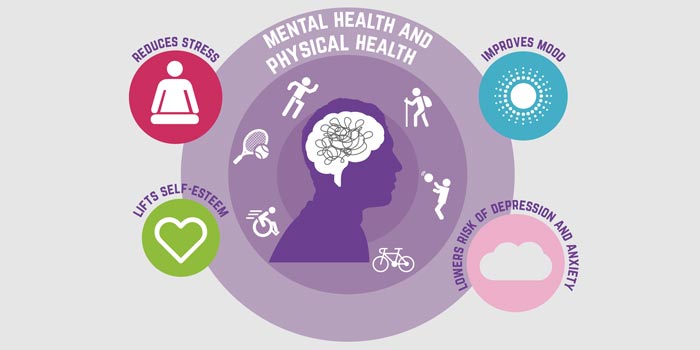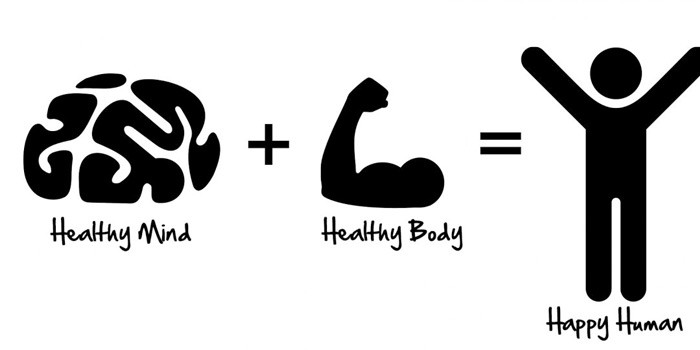Book: Health and Fitness
Author: Nayma Nishat - Researcher, Health & Fitness

Do you know exactly, what Does Mental Health Mean & How does Mental Health Affect Physical Health? Most of us, when we hear about mental health, we immediately think of worst-case scenarios such as depression, anxiety disorders, schizophrenia, eating disorders and addictive behaviors, and others.
But mental health is not having a mental illness. Rather Mental health is something that people have the ability to control to work for and achieve. It is all about your ability how you address all of the issues in your life.
Mental health is someone’s state of psychological well-being. It is your ability to handle or cope with stress and enjoy daily life which includes the way you feel, think, act, and relate to others.

According to the Public Health Agency of Canada (PHAC),
“Mental health is the capacity of each and all of us to feel, think, and act in ways that enhance our ability to enjoy life and deal with the challenges we face. It is a positive sense of emotional and spiritual well-being that respects the importance of culture, equity, social justice, interconnections, and personal dignity.”[1]
The World Health Organization (WHO) says,
“Mental health is defined as a state of well-being in which every individual realizes his or her own potential, can cope with the normal stresses of life, can work productively and fruitfully, and is able to make a contribution to her or his community.”[2]
The WHO also states that mental health “is not just the absence of mental disorder.”
Ultimately, mental health is about being emotionally, cognitively, and socially healthy and the way we think, feel, and develop relationships and not merely the absence of a mental health condition.
By understanding what mental health really is and its’ importance, we can enhance our mental health across the lifespan.
Your body responds to the way you think, feel, and act. This is one type of “mind-body connection.” When you are stressed, anxious, or upset, your body reacts in a way that might tell you that something isn’t right.[3] For example, you might develop high blood pressure after a particularly stressful event, such as the accident of a loved one.

Your mental health influences your thoughts, feelings, and behaviors in daily life. It also affects your ability to cope with stress, take and overcome challenges, build relationships, and recover from life’s setbacks and hardships.
So, when you learn to cope with a specific mental health problem, we can handle your emotions better, or simply to feel more positive and energetic, and have healthy relationships.
Physical health–mental health relationship is correlated. We need to know mental health in the same way we know physical health. And it needs to start at a young age and carry out through every level of our lives.

If I ask you about physical health, you may talk about muscles, strength, physical activity, exercises, yoga, diet, nutrition, etc. But what comes in your mind when you hear about mental health? Let me help you_
You must remember that your brain is one of the most important parts of your body and you can exercise it just like you the rest of your body. There are exercises like crosswords, puzzles, memory games, and so on.
Another thing you can do is evaluate your coping mechanisms. Think about how you cope with the situation, what you can do to make your coping more effective, and let that strengthen your mind as you use exercise and strengthening workout to make your body stronger.
A cross-sectional study recently published in The Lancet Psychiatry synthesized data from 1.2 million people in the United States between 2011 to 2015 and concluded that five types of workouts reign supreme for your mental health. Results showed all methods of movement to be staggeringly effective; even doing household chores diminished the number of participants’ poor mental health days by 11.8 percent. But, across the top five exercise buckets, team sports reduced bad mental health days the most, by 22.3 percent, then cycling by 21.6 percent, aerobic or gym exercise by 20.1 percent, running or jogging by 19 percent, and recreational sports (like basketball or softball) by 18.9 percent.[4]
So, it is important to incorporate exercise daily to ensure good physical and mental health.
Mental Health is not a lottery, we all need to take care of it and cultivate it, and more in these times. From childhood and adolescence to adulthood, it is important that we take the necessary steps to protect and nurture our mental and behavioral well-being.
We all know, knowledge is power. ‘The more you know, the more power you have.’ And this power can cause a positive effect on us. By understanding what mental health is, its effects, and its importance, we can overcome challenges and recover from life’s setbacks and hardships.
References:
© 2025 The World Book. All Rights reserved.
Founder: Nayma Nishat